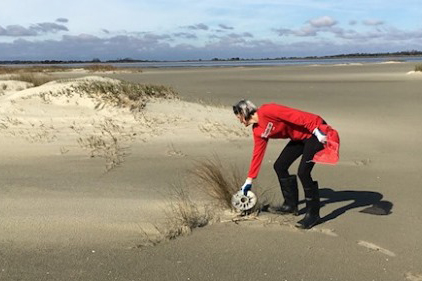We know picking up trash helps keep our environment clean, but could it also improve human health?
Jennifer Gay, an associate professor in the UGA College of Public Health, is studying the impact of volunteer litter cleanups on the environment and human health in coastal communities.
A UGA Public Service and Outreach Faculty Fellow, Gay is partnering with Marine Extension and Georgia Sea Grant to learn more about the amount or type of physical activity that occurs in coastal environments, or how the environment contributes to healthy lifestyles.
“Through this study, we want to engage people who are participating in litter debris cleanups to assess the amount of physical activity they’re getting and how much energy they’re expending during these events,” said Gay, who researches physical activity and public health.
As part of the study, Gay worked with Katy Smith, water quality program coordinator for UGA Marine Extension and Georgia Sea Grant, to figure out how to apply the study in the Golden Isles community. Smith, who leads education and outreach initiatives focused on marine debris topics, has strong connections to the volunteer community through partnerships with conservation organizations like Keep Golden Isles Beautiful and the Georgia Sea Turtle Center, which host volunteer cleanups throughout the year.
“I’m excited to see what type of data we capture,” Smith said. “We’ve got people out there cleaning the environment, but what else are they gaining? Hopefully we can use the data to get more people involved in conservation efforts.”
Smith is helping Gay survey people in Brunswick, St. Simons and Jekyll Island to understand how they perceive the coastal environment. They are recruiting volunteers to wear monitoring equipment that collects data on physical activity during cleanups. Those that agree to participate wear heart rate monitors and accelerometers that track frequency, intensity and duration of an activity, as well as step counts over a one- to two-week period.
Sharon Hindery, who worked in a medical laboratory for several years before retiring, jumped at the chance to participate in the study.
Eventually I’d like to see what the data shows, said Hindery, who is particularly interested in the heart rate data following a cleanup event.
“I imagine that would be some kind of an indicator of satisfaction. After the event is over, you sit back and realize what you’ve done. Maybe that is kind of calming. Who knows?” she said.
Hindery and her husband Rick have lived in Brunswick for six years. During that time, they have helped with several debris removal volunteer efforts, even adopting a section of Highway 17 that they are responsible for cleaning throughout the year.
“I always joke that it’s exercise with a purpose,” Hindery said. “I go out and I pull a bag or two of trash off the marsh or the side of the road, and I look back at it and I feel better.”
Next steps in the study involve recruiting more volunteers so the team has a larger set of data to assess. Smith hopes to bring in several volunteers ahead of the World Oceans Day Beach Sweep on June 8, hosted by Keep Golden Isles Beautiful and Marine Extension and Georgia Sea Grant and sponsored by Yamaha. More information is available here https://bit.ly/2JflIPI
Those interested in volunteering for the study are encouraged to reach out to Katy Smith at [email protected].
After analyzing the data, the research team plans to develop educational outreach materials designed to engage people who are aren’t as active or involved in litter debris cleanups as a way to get them involved in physical activity and environmental stewardship.
The Public Service and Outreach (PSO) Fellowship Program provides departmental support for tenure-track and tenured professors to immerse themselves in the work of a PSO unit for one semester. The experience offers opportunities for fellows to enhance their academic courses, conduct research and apply their academic expertise to outreach initiatives. An anticipated outcome of the fellowship experience is the sustained involvement with Public Service and Outreach after the semester ends.
– Emily Kentworthy
This story was originally published at UGA Marine Extension and Georgia Sea Grant website.
Posted on March 25, 2019.







